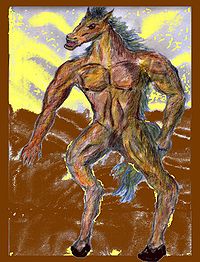The Square Cube Law and How It Killed Giants
We are so used to the idea
of giants that we take it for granted that they exist, or must have existed at one point
in our history.
You know, those very large and very tall human-like creatures,
carrying a humongous club, and being very nasty. Like this:
And if you are a typical,
god-fearing Catholic Pinoy, you would swear that not only are they true, you
even saw one beside that big-ass, scary-looking tree not far from your home, one night when
you were going home after an evening of binge-drinking with your buddies. And
the bastard’s smoking a cigar as long and as big as your leg! Or you know someone
who saw one of those cigar-smoking monsters.
This creature is called a kapre—a cigar-smoking giant wearing a
loincloth.
Or maybe a tikbalang—a half-man, half-horse
creature about as tall as a kapre. Unlike a centaur, however, a tikbalang is a giant with the torso and
arms of a man, and the head and legs of a horse.
Scary creatures, these—and, if I may add, folktales
about these creatures are awesome! (Philippine folklore is rich and very
entertaining, filled with terrifying creatures straight out of your worst
nightmares; Neil Gaiman has stated in an interview that his favorite Philippine mythological character is the manananggal.)
Are these creatures
possible, though? Do Kapres and Tikbalangs exist, in real life?
No. Kapres, tikbalangs, or
even Cyclop and King Kong and other giant creatures are un-possible, and that’s because of this thing called “The Square
Cube Law.”
A scientific principle often
ignored by scriptwriters, the square cube law (first proposed by Galileo), states
that when an object
undergoes a proportional increase in size, its new volume is proportional to
the cube of the multiplier and its new surface area is proportional to the
square of the multiplier.
For
example, if you double the size of a cube, its surface area is increased four
times, while its volume, or weight, is increased eight times.
Using Jell-O as example:
Alright, so
imagine a perfect cube of that fruity lime-flavored gelatin dessert sitting on
a plate. Let’s say the cube is 1 inch in all directions.
But, seeing as how there’s always room for Jell-o, you say you want “twice as much”. So, you would
be expecting a cube that is two inches tall. Twice as much, right?
Not so! It
may be twice as tall, and twice as wide, but the other measurements of size
have more than doubled. The surface area has been squared, and the volume has
been cubed. (hence Square-Cube Law) So, going
by the volume, you actually have eight times more Jell-o in a 2-inch-sized serving as you do in
a 1-inch-sized serving. A serving 4 inches across would contain 64 times as much Jell-o!
This exponential growth puts a hard limit on how
big your Jell-o serving can get before it overwhelms the structural integrity
of gelatin. As the volume increases, so does the weight of all that Jell-o
pushing down on the bottom-most layer (the mass is growing faster than the
footprint, so the pressure increases) If you visualize this growing cube on
your dinner table, you can picture it begin to bulge and eventually crush
itself into a gooey mess.
Or
think of a six-foot man, who suddenly became twice as big. His surface area is
quadrupled, and his weight is increased
eight times. With all that weight, he wouldn’t be able to stand on his own
legs, because although they may have become twice as long and four times as
wide, his weight in the meantime became eight times heavier. He wouldn’t be
able to stand, much less chase anybody around. His legs would snap off.
The
evolutionary biologist J. B. S. Haldane, in his essay On Being the Right Size, “discusses proportions in the animal world and the
essential link between the size of an animal and these systems an animal has
for life.”
The bigger an animal gets, the more would they
have to change their physical shape, but the weaker they would become. There is a reason why an elephant is shaped
that way, or why a mouse (and other creatures of that size) has that kind of
bone structure.
So, giant ants, giant scorpions, etc. does not,
and would not, exist. Billions of years of evolution have determined the
correct size for them.
Read more about the Square Cube Law:





Comments
Post a Comment
So, what do you think? Post it here: